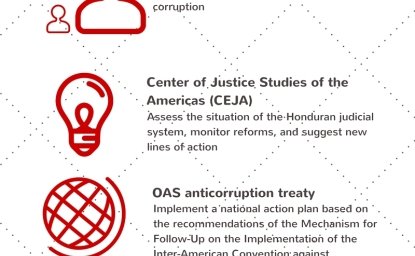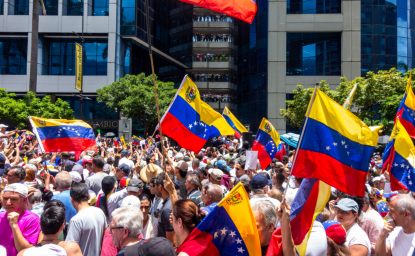For the past few months intense negotiations have been underway between the Government of Honduras (GOH) and the office of the Secretary General of the Organization of American States over an agreement to form a Support Mission Against Corruption and Impunity in Honduras (MACCIH). As the name implies, the agreement in question would define the authorities and parameters of an international mechanism, requested by the GOH, to support its efforts to root out corruption and reduce impunity that undermine the rule of law and economic opportunity in the country.
In two previous posts we have outlined our concerns about the relatively weak initial MACCIH proposal and how this proposal could be strengthened to ensure constructive action against corruption and impunity.
Since the process began in September there have been two iterations of an agreement proposed by the OAS General Secretariat (OAS/GS). The GOH has significantly revised both of these versions, in some cases expanding the focus — not always a bad thing — and in other instances weakening the independence and latitude of the MACCIH. At present, the OAS negotiating team is considering the latest version the GOH presented Friday, December 4.
The back and forth negotiations have become worrisome and wearisome. The GOH had announced that President Juan Orlando Hernández would travel to Washington to sign the final deal with the OAS December 10, but over the weekend decided to postpone the signing until an unspecified date in January. At present it is not entirely clear why the GOH postponed the signing. It could be a positive sign, giving the OAS more time to negotiate and perhaps to strike a better deal.
Based on our review of the various drafts of the agreement and dialogue with representatives from the OAS, the GOH, and the United States Government, we believe the following specific elements need to be taken into consideration to ensure the final agreement, whenever it is signed, has real teeth.
- Creation of a special combined unit of Honduran prosecutors and judges that works with the MACCIH to investigate cases of corruption and impunity. This idea is currently on the table and is included in earlier OAS and GOH draft agreements. Nevertheless the most recent draft leaves vague the role of the MACCIH in selecting, certifying, and supervising the Honduran prosecutors and judges that will comprise the special unit. Vagueness on this point is risky and unacceptable. It is absolutely essential that the final agreement specifically spell out that the MACCIH will have the authority to select, certify, and supervise the members of the special unit, as well as the authority to prioritize and select cases to be investigated and follow them throughout the judicial process. The cases selected need to be emblematic and tackle the structures of corruption and impunity that have allowed injustice to thrive in Honduras.
We recognize that as an international mechanism the MACCIH will not have the authority to carry out its own prosecutions. The CICIG in Guatemala, often considered to be the gold standard, cannot prosecute cases either. But by selecting cases and supervising the work of chosen prosecutors and judges, the MACCIH can do a lot to ensure political pressures do not interfere with the search for justice. - The agreement must make explicit that the MACCIH and the special unit of Honduran prosecutors and judges have full access to government information, personnel, and facilities as well as the authority to meet with and conduct interviews with personnel from all levels of government, including the military. The latest version of the draft agreement makes a general commitment to cooperating with the MACCIH, but this must be spelled out explicitly as above.
- Informing civil society of the work and strategic directions of the MACCIH and special unit are essential to building the credibility and public support for this endeavor. The MACCIH agreement needs to include specific language about regular reporting by the MACCIH’s Head-of-Mission, as well as his/her authority to speak extemporaneously to the Honduran public, civil society, media and international community as important developments warrant.
- Similarly, the MACCIH agreement needs to establish mechanisms for inclusive civilian input and oversight including regular contact between citizens, the MACCIH, and GOH officials. The current draft agreements are very vague on this issue and should state explicitly commitments by the MACCIH and GOH to meet regularly with civil society including research and academic institutions, citizens groups, non-governmental organizations, and the private sector, among others.
- The criteria under which the MACCIH can withdraw from Honduras should be made explicit. These criteria should include, among others, lack of cooperation from the GOH and personnel from all levels and institutions of government and non-compliance by the GOH with the letter and spirit of the signed agreement.
No one in the U.S. Congress, within Honduran and U.S. civil society, or among the international community wants to support yet another meaningless process with no chance to have an impact. It is time to refocus on the goal that everyone shares — building a strong accountable democratic Honduras that serves the interests of its people and not simply the interests of the privileged and powerful few.
In addition to these five essential components to strengthen the final agreement, there are two additional priority issues that the OAS/SG should take into consideration.
- Consultation and partnership with the Attorney General’s office (Ministerio Público, or MP). In the Honduran justice system, the MP is independent of the executive branch. As a result, the MACCIH negotiations thus far have been appropriately between the Secretary General of the OAS and GOH’s executive branch, primarily the Foreign Minister. But the MP will ultimately be a key partner in ensuring the MACCIH’s work has teeth and is conducted according to the law. It is very important that the concerns and proposals of the MP be taken into consideration during the negotiation phase.
- Appointment of the MACCIH’s Head-of-Mission is fundamentally important to the success of the endeavor. Even if the final agreement contains all the key elements we outline above, these can be undermined if the Head-of-Mission is weak, or does not demonstrate the political will to confront entrenched political and criminal interests. This appointment will be an important test of the Secretary General’s own commitment to making this a valid and worthwhile process.
So far, the GOH has sought to down play the Head-of-Mission designation and preferred to designate a “spokesperson” to speak on behalf of the various units and divisions within the proposed MACCIH. Whatever the ultimate title is, it is vitally important that his/her authorities include coordinating the work and speaking for the mechanism before the OAS Permanent Council, the public, and the press.
Concluding thoughts: The current dialogue about the nature of MACCIH’s mandate and authorities presents an incredible opportunity for Honduras and the Honduran people. If handled well, it can begin to break the power of organized crime and corrupt officials in Honduras, which in turn will be good cause for celebration. To squander this opportunity by failing to put in place a meaningful body with teeth would be a mistake. Simply signing a vague agreement in the hope of some future payoff is no longer a viable alternative. No one in the U.S. Congress, within Honduran and U.S. civil society, or among the international community wants to support yet another meaningless process with no chance to have an impact. It is time to refocus on the goal that everyone shares — building a strong accountable democratic Honduras that serves the interests of its people and not simply the interests of the privileged and powerful few.
(Viva Honduras Cookign Vent by Nan Palmero is licensed under Creative Commons BY 2.0)
Authors

Director of Policy and Strategic Initiatives, Seattle International Foundation

Latin America Program
The Wilson Center’s prestigious Latin America Program provides non-partisan expertise to a broad community of decision makers in the United States and Latin America on critical policy issues facing the Hemisphere. The Program provides insightful and actionable research for policymakers, private sector leaders, journalists, and public intellectuals in the United States and Latin America. To bridge the gap between scholarship and policy action, it fosters new inquiry, sponsors high-level public and private meetings among multiple stakeholders, and explores policy options to improve outcomes for citizens throughout the Americas. Drawing on the Wilson Center’s strength as the nation’s key non-partisan policy forum, the Program serves as a trusted source of analysis and a vital point of contact between the worlds of scholarship and action. Read more




